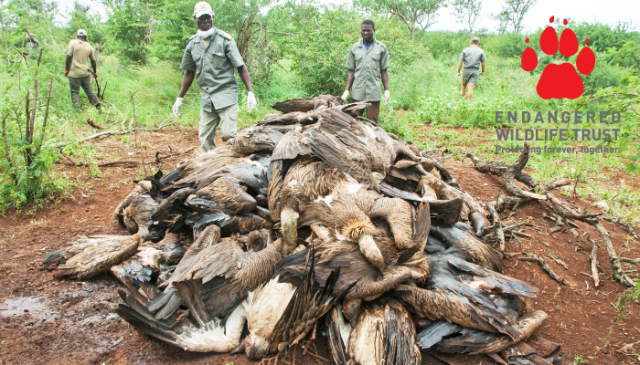
The Endangered Wildlife Trust (EWT), champion of conservation in Africa, is deeply saddened to report another mass poisoning of vultures in southern Africa. On 25 February 2018, EWT vulture expert, Andre Botha, assisted at a harrowing scene in the Mbashene communal area in southern Mozambique, where the deliberate poisoning of an elephant carcass affected at least 104 Critically Endangered vultures.
This has resulted in the death of at least 80 African White-backed Vultures (Gyps africanus) and seven Hooded Vultures (Necrosyrtes monachus), with the likelihood that many more fatalities may be discovered by further sweeps of the surrounding area in the next 48 hours. The small tusks taken from the young dead elephant, as well as the toxic substance used to poison the carcass, have been confiscated by law enforcement officers, and a suspect is in custody. Some of the dead birds found were mutilated, which may suggest harvest for belief-based purposes, but without all the information available at this early stage, it is difficult to speculate as to the motive for this poisoning. What is known, is that vultures in Africa are being poisoned deliberately by poachers to prevent the birds alerting authorities to the poachers’ illegal activities, or for harvesting and sale of body parts for belief-based use.
Fortunately, 17 birds that were immediately treated by the response team have responded positively to treatment thus far, and we continue to hope that they will pull through. Rapid response and appropriate treatment of poisoning victims can make all the difference. We are extremely grateful to the response team, which included the EWT’s Andre Botha and the Incomati Conservancy, which is adjacent to the communal area where the incident took place, particularly owner, Dries Gouws, and area manager, Piet Kok, as well as the responding vet, Dr João Almeida from Sabie Game Park and the State Veterinary Services at Skukuza, for their incredible response to this incident. Without their actions, the outcome could have been far worse.
The EWT’s training programme on the effective intervention of wildlife poisoning incidents, and the development and distribution of Poison Response Kits to participating organisations, in partnership with The Hawk Conservancy Trust and the University of Reading, providing them with the essential equipment to take action when they handle poisoning incidents, is proving vital in situations such as this. This work facilitates a coordinated, quicker and more effective response to incidents, with more efficient clean ups of poisoning sites, directly reducing further poisoning of wildlife.
This terrible incident is yet another stark reminder of the increasing threat poisonings pose to our dwindling vulture populations. Poisoning is the most significant threat to vultures in Africa and Eurasia and, over the last 30 years, has contributed to declines in excess of 80% in some African species. Currently, the IUCN Red List of Threatened Species lists four species of African vulture as Critically Endangered and three species as Endangered. As obligate scavengers, vultures are incredibly vulnerable to poisoning, particularly at carcasses that are laced with these lethal substances. In addition to this, feeding habits that see hundreds of vultures gathering to feast on large carcasses, such as those of elephants, make them even more vulnerable to mass poisoning fatalities.
The EWT has been documenting wildlife poisoning and addressing the conservation threats for over 20 years, and has noted a rapid escalation in the use of poisons in recent years for various reasons. These include the use of poisons to target specific species such as elephants that provide high-value by-products for trade, as well as mammalian carnivores or monkeys that cause damage to domestic livestock or crops. We also note with concern the use of poisons to procure wildlife that may provide a food source such as game birds. We are working hard to tackle the scourge of poisoning, providing support and guidance to law enforcement officials, ensuring that proper investigation and prosecution procedures are followed, and training conservation and agricultural staff to make sure that they are equipped to deal with this terrible threat.
End
Contacts
Andre Botha
Manager: Special Projects
Endangered Wildlife Trust
Tel: +27 82 962 5725
Belinda Glenn
Marketing and Communications Manager
Endangered Wildlife Trust
Tel: +27 87 021 0398

This is heartbreaking news. It seems that every living creature in Africa is not safe from either poachers or farmers. It is good that the young people are being taught the value of saving the wildlife, and, hopefully, they can spread the word that this is wrong. Very sad, when will it end?